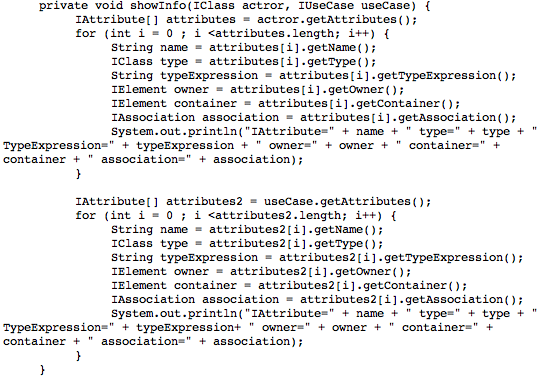 Forum Index - Topic Index Forum Index - Topic Index Astah API Astah API
 Read use case description with API Read use case description with API |
| Threaded | Oldest First | Previous Topic | Next Topic | Bottom |
| Poster | Thread |
|---|---|
| bisnard | Posted on: 2010/10/22 21:20 |
Just popping in   Joined: 2010/9/7 From: Posts: 8 |
Re: Read use case description with API Thanks a lot for your answer. With getType() and a check on the class this is perfect
 Cheers benjamin |
| Joba | Posted on: 2010/10/22 3:26 |
Developer   Joined: 2006/6/6 From: Posts: 969 |
Re: Read use case description with API Hi Benjamin,
Let me show an example. So you have this association between Actor0 and UseCase0 as the figure below.  Quote: This returns as below: Quote: So by letting each association end have a name, you can identify the association ends with getName(). Without having association end names, (getType(), getTypeExpression(), getOwner(), getContainer()) and checking IAssociation from getAssociation() will do. Quote: How to check that one end of the IAssociation is a Use case? Hope it helps.  Cheers, Satomi |
| bisnard | Posted on: 2010/10/20 18:57 |
Just popping in   Joined: 2010/9/7 From: Posts: 8 |
Read use case description with API Hello!
I would like to export all parts of the Use case object using the API. This is ok for taggedValues and for extensions/includes but for the relationships between UC and Actors I could not find a good way  - Is there another way of identifying the ends of an IAssociation (between Actor and UC) than using the IAttribute.getTypeExpression() value for each end of the association? How to check that one end of the IAssociation is a Use case? Thanks a lot, Benjamin |
| Threaded | Oldest First | Previous Topic | Next Topic | Top |

















